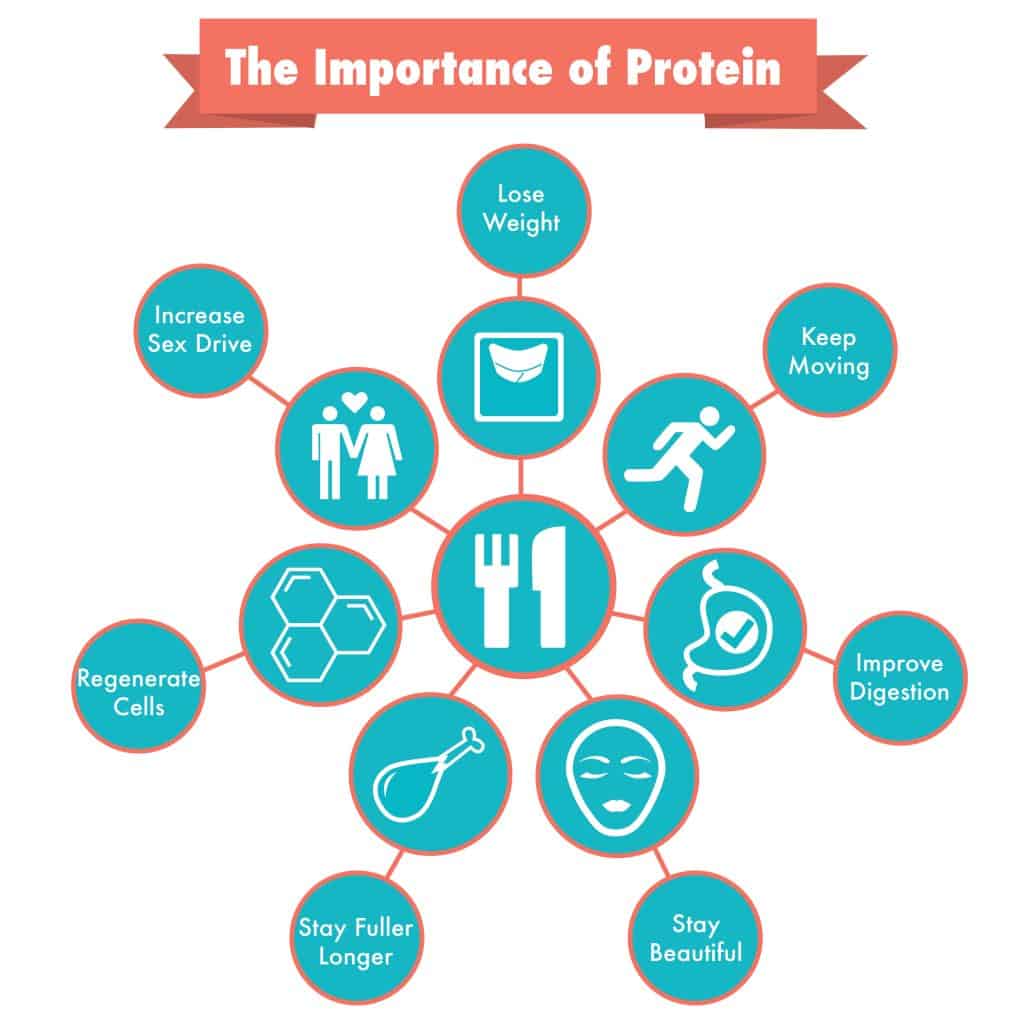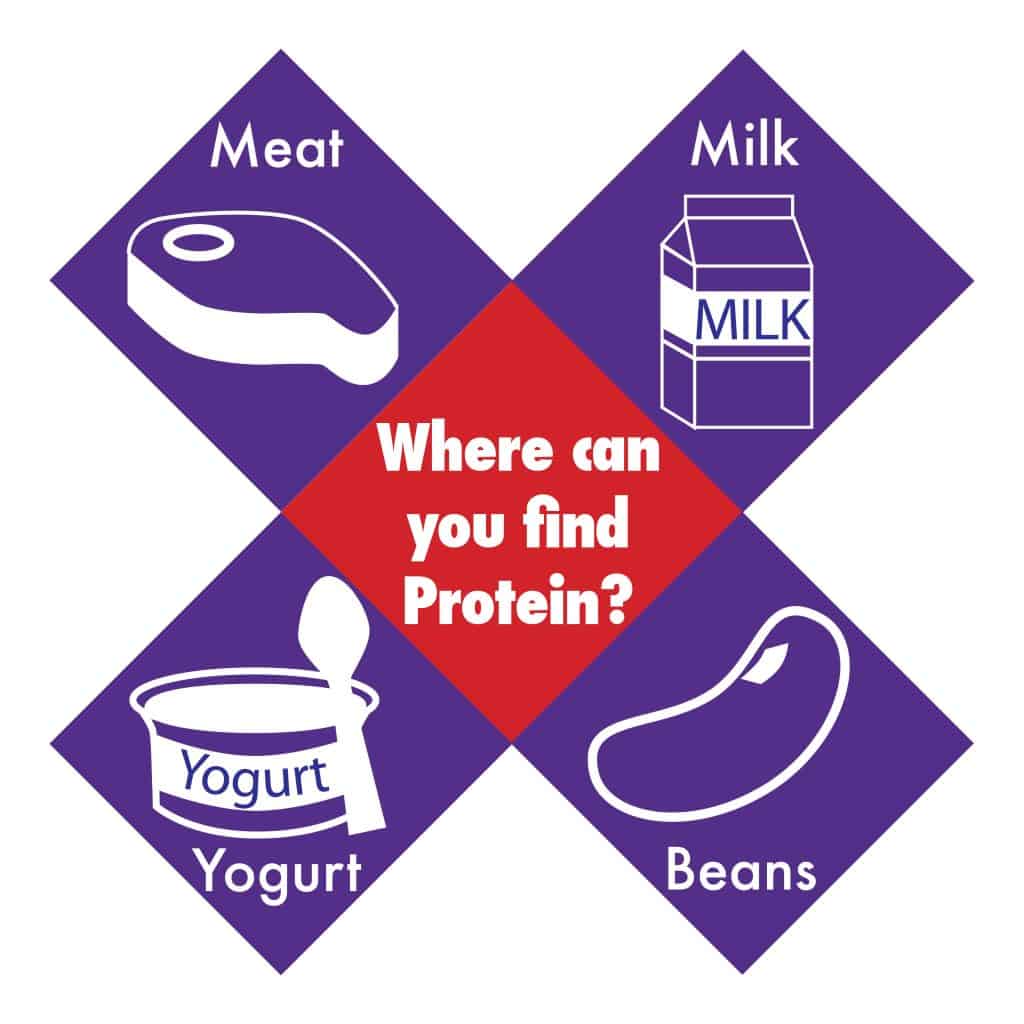If you have been paying attention to the health and wellness world, you’ve probably heard the word “protein” more times than you can count.
That’s because protein is essential to your health for so many reasons.
But how much protein do you really need?
You’d think it would be a nice, round number, but it’s a trickier question than you’d think.
“Asking how much protein somebody needs is like asking how much money somebody needs. It all depends on your goals, and it is different for everyone,” according to Erik Frank, CEO of Your Nutrition Delivery. “If you want a country estate and a Mercedes Benz, you will need a whole lot more money than if you rent a one bedroom and ride the metro.”
Before we get into how much protein you need, let’s discuss why it even matters in the first place.

The Importance Of Protein
Think protein is blown out of proportion in the health community? Think again.
Related: Get Jacked: 5 Ways To Boost Your Protein Intake
“Protein is an important constituent of every cell in the body,” says David Zulberg, author of The 5 Skinny Habits: How Ancient Wisdom Can Help You Lose Weight And Change Your Life Forever. “Your body uses protein to build and repair tissues, make enzymes, hormones, and other body chemicals.”
Here are just a few important functions of protein in your body that you don’t even know about.

1. Protein aids your digestion
Protein keeps your stomach doing its thing. “Almost half the protein we consume goes into making enzymes which help digest food,” according to Felice Kosakavich, chief clinical dietician at Cassena Care.
2. Protein keeps you beautiful
That’s right—protein keeps up your stunning good looks!
Related: Turn Heads With Healthy Winter Hair! Here’s How
It’s needed to maintain hair, nails, skin, and muscle, says Kosakavich. Carolyn Dean, Medical Advisory Board Member of the Nutritional Magnesium Association, adds that your body is 16% protein, so stop eating it and you’ll be looking quite sickly indeed.
3. Protein aids your sex drive
Dean says that protein is needed to make things steamy in the bedroom by keeping your libido in check.
4. Protein keeps you fuller, longer
Getting too hungry, too often? You may need more protein in your diet.
“Protein contains fat and sometimes fiber, which are critical for slowing the release of glucose into the blood stream,” says Jenny Evans, nutrition and exercise physiology expert and author of The Resiliency rEvolution: Your Stress Solution For Life. “A slower release of glucose means a slower release of energy, and translates into feeling fuller for longer.”
Related: Always Hungry: The Top 10 Foods That Fill You Up
5. Protein helps you lose weight
According to fitness expert Rob Miller, proper protein intake has been shown to increase metabolic rate by up to 100 calories per day.
“Increasing protein intake to up to 30% per day can lead to lower overall calorie intake, thus leading to weight loss,” says Miller. “Studies on women increasing protein intake to 30% over 12 weeks lost an average of 11 pounds.”
6. Protein keeps you moving
According to Dean, motion literally depends on proteins in the muscles. That’s one of the reasons why a deficiency can make you feel weak—and why bodybuilders and athletes need so much.
Related: 19 Best Foods For Athletes
7. Protein helps your body regenerate
According to Kosakavich, protein is necessary for the body to build new cells and tissues. Barbara Wade, personal trainer, fitness model, and founder of Fit And Ageless Over 50 adds that it replaces worn-out cells, transports nutrients, and helps electrolyte balance.
“Protein is not only critical to every single cell in your body, but also to the hormones and enzymes your body produces,” says Dean. “Protein allows the neurotransmitters on our cells to communicate with each other. A lack of protein can affect everything.”
In a nutshell, protein is necessary to keep your body strong and healthy.
But here’s what makes things complicated: you might be eating too much protein.
Related:5 Ways To Avoid Overeating
The Danger Of Eating Too Much Protein
“With all the buzz about protein, you might think Americans were at risk for not eating enough, but in reality, most of us eat more protein than we need,” says registered dietician and lead nutrition expert Rene Ficek.
According to Ficek, Americans consume about twice the amount of protein than they actually need. “And when it comes to protein, more isn’t necessarily better,” she warns.
We covered the necessity of protein and why you need to eat enough, but here’s what happens if you eat too much:
1. You’ll gain weight.
Protein is often associated with rippling muscles. It is true that protein is essential in building muscles, but too much will lead to the opposite. “Eating large amounts of lean protein will not equate with a toned body, although that is what many supplement companies want you to believe,” says Ficek.
Related: The Real Truth Of Vitamin Supplements You Should Know
Many protein-laden foods and shakes are loaded with calories, which are needed if you’re spending a lot of time in the gym. But if you don’t burn those extra calories, they’ll simply be stored as fat.
2. You can harm your kidneys.
If you eat a ton of protein—especially if you restrict carbs—your body will build up toxic ketones. “Toxic ketones are substances made when the body uses its own fat cells for fuel in the absence of sufficient carbohydrates,” said Ficek. “Ketones can harm the kidneys as they try to excrete these substances.”
3. You can weaken your bones.
According to Jenny Evans, eating too much protein can make you lose calcium, which can increase the risk of osteoporosis. “The body can only process so much protein at one time,” says Evans.
Related: How To Prevent Osteoporosis Naturally In 3 Ways
4. Too much protein is bad for the heart.
According to Ficek, The American Heart Association does not recommend high-protein, low-carbohydrate diets “because they often contain high-fat foods and can lead to deficiencies in some nutrients like fiber and many vitamins.”
Where To Find Protein
There are plenty of great protein sources out there. However, a note of caution: keep in mind that plant-based sources are better than animal-based sources.
“Protein can also be high in saturated fat, so if consuming animal sources, choose those leaner, or lower, in fat,” said Evans. “Plant proteins are naturally low in fat and have the advantage of being high in fiber, which also helps with a lower and slower blood glucose effect.”
Related: How You Can Have A Lower Blood Pressure Naturally
Vice President of Health for Hallelujah Diet Olin Idol agrees, adding another warning: cancer. “It is animal protein intake that Dr. T. Colin Campbell found to be the promoter of the development and growth of cancer in lab animals,” he says. “He could turn on and turn off cancer growth by varying the amount of animal protein in their diet.”
Our experts agreed that the following foods are a great way to get protein.

1. Meat, Poultry and Fish
A small three-ounce piece of meat has 21 grams of protein, according to the CDC. A typical 8-ounce piece could have over 50 grams!
To get an idea of your portion sizes and avoiding eating too much protein, a three ounce piece of meat is generally the size of a deck of cards.
“Imagine a typical steakhouse dinner eight-16 ounce portion exceeding protein needs for over three days,” says Ficek. “A good rule of thumb would be to follow two three-ounce portions of meat daily for adequate protein intake.”
There are also plenty of on-the-go snacks for a great protein fix like biltong & beef jerky.
Related: 6 Surprising Protein Facts Meat-Eaters Will Love
Don’t forget that there are better meats than others. According to fitness expert Allison Hagendorf, “protein is not just about quantity, it’s also about quality. It’s best to eat organic, lean protein sources such as chicken breast, grass-fed bison, and wild-caught salmon.”
2. Milk
Another good source of protein is milk—one cup has eight grams of protein.
3. Yogurt
According to the CDC, one eight-ounce container of yogurt has approximately 11 grams of protein.
4. Beans and Legumes
Here’s one that you’re probably not taking advantage of: one cup of dry beans has about 16 grams of protein.
So we’ve covered the importance of protein, the dangers of eating too much protein, and the best protein sources. But how much is the definite amount you should have a day?
Related: 10 Protein Snacks Every Health Nut Should Eat
How To Figure Out How Much Protein You Need
“A simple question…to which there is no simple answer,” says Hollywood cardiologist Dr. Adam Splaver. “The amount of protein you need actually depends on your weight and level of activity.”
According to fitness minimalist Pat Flynn, the “scientific minimum” is 75 grams a day. “But that is for anybody who is weight training and wants to put on muscle, assuming overall calories are still in surplus.”
But what about the rest of us? Our experts gave us several ways to look at it.
1. This simple mathematical formula…
A good rule of thumb, according to Splaver, is the following formula. First, take your weight in pounds and divide by 2.2. That gives you your weight in kilograms.
Related: How To Lose Weight Without Diet Or Exercise
Next, figure out your activity level. “Multiply by 0.8 if you are sedentary…or 1.8 if you are an athletic beast preparing for the Olympics,” says Splaver. “Choose a number somewhere in between if you are a normal mortal like me who exercises regularly.”
The number you get should be the amount of protein in grams that you need on a daily basis.
“However, you should never consume more than 25-30g of protein in one sitting,” says Splaver. “That’s because your body can’t absorb more than that at any one given meal.”
2. …or this formula
According to Dean, “This is the guideline that I use: Multiply your ideal body weight in pounds by 0.35. So if a healthy weight for you would be 110 pounds, you need 110 x 0.35 = 39 grams of protein a day. Multiply by 0.9 for growing infants. Multiply by 0.54 for growing adolescents.”
Related: 5 Diet And Weight Loss Tips Holding You Back
3. Per pound of bodyweight
“Generally, an athlete will consume 1 to 1.5 grams of protein per lean pound of body mass,” says Frank. “As a former professional Powerlifter, planning my protein intake was a full-time job. I would eat 2 grams of protein per lean pound of body weight.”
Fitness expert John Rowley agrees, adding, “This is a unisex rule. It doesn’t matter if you are a man or a woman. It is still one gram of protein per pound of body weight. Use your current weight, not your goal weight!”
Frank doesn’t recommend this amount for those who aren’t very active. “If someone is trying to lose weight, he or she can consume as little as .60 grams of protein per lean pound of body weight,” says Frank. “Therefore, a 160 pound woman that was 30% body fat might consume around 65-75 grams of protein as part of a 1200 calorie diet.”
Related: Cool New Way To Burn 947 Calories A Day
4. By percentage of calories taken in
According to Zulberg, you should get from 10 – 35% of your daily calories from protein. “That’s about 46 grams of protein for women, and 56 grams of protein for men,” he says.
5. By gender and age
According to nutritionist and certified dietician Sharon Richter:
Babies need about 10 grams a day.
- School-age kids need 19-34 grams a day.
- Teenage boys need up to 52 grams a day.
- Teenage girls need 46 grams a day.
- Adult men need about 56 grams a day.
- Adult women need about 46 grams a day
- Pregnant or breastfeeding women need 71 grams a day.
Related: 5 Things Men Hate About Women
6. By activity level
“Yes, while it is true that endurance and strength athletes need a little more protein than the average person, research shows us that protein needs are not as high as commonly perceived,” says Ficek.
According to Ficek, power athletes need 1.2 – 1.7 grams per kilogram a day, endurance athletes need 1.2 – 1.4, and sedentary or moderately active adults need 0.8 – 1.2 a day.
So Really, How Much Do You Need A Day?
Unfortunately, this is a question that seems like it should have a definite answer, but does not.
Related: 4 Questions That Brought An Entire High School To Its Knees
“This is a question that is asked very often and has many different answers,” says trainer and YouTube celebrity Mike Chang. “It is really a numbers game based upon how much lean body mass you have, how much you work out, and how much muscle mass you are trying to add…The amount of protein that a certain individual needs per day cannot be one exact number; it is a calculation based on energy expenditure, physical activity, and the goals that the individual has set for him/herself.”
Using the above methods, take note of your activity level, your gender, your weight, your age, and your desired body goals. Then, be smart about how you eat.
Related: 5 Tips If You’re On A Diet To Lose Weight
“It’s important to spread out your protein intake throughout the day,” warns Evans. “Make sure each meal and snack contains some protein and it’s vital that breakfast contains protein. Protein at breakfast ensures a steady release of glucose and energy for the body and brain to function well.”
The Takeaway
Protein is essential to living healthy and well, but it’s also important not to consume too much of it. Be kind to your body by keeping track of how much protein you take in and through what sources. Remember: it’s all about balance.
***************
 Sammy Nickalls is the Content Manager at Inspiyr.com. She is an avid health nut and a lover of all things avocado.
Sammy Nickalls is the Content Manager at Inspiyr.com. She is an avid health nut and a lover of all things avocado.
Photo by HOT!
